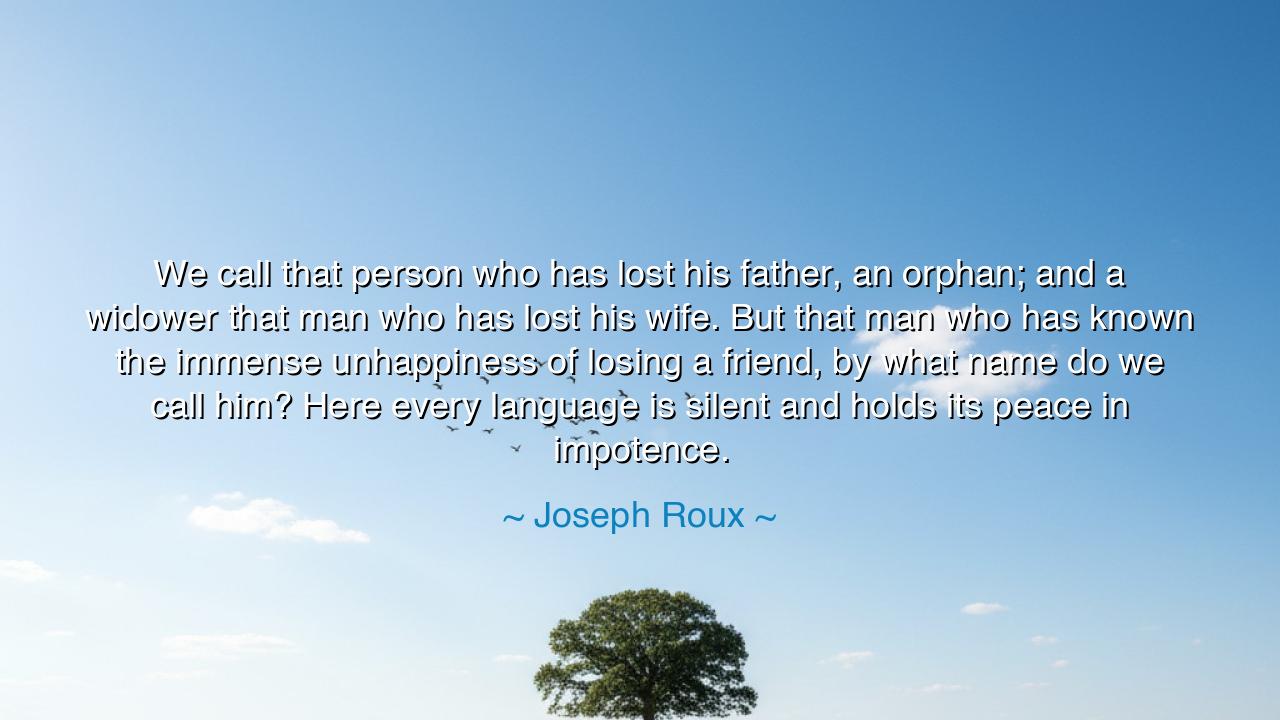
We call that person who has lost his father, an orphan; and a
We call that person who has lost his father, an orphan; and a widower that man who has lost his wife. But that man who has known the immense unhappiness of losing a friend, by what name do we call him? Here every language is silent and holds its peace in impotence.






“We call that person who has lost his father, an orphan; and a widower that man who has lost his wife. But that man who has known the immense unhappiness of losing a friend, by what name do we call him? Here every language is silent and holds its peace in impotence.”
Thus wrote Joseph Roux, the French priest, poet, and philosopher whose words often breathed the quiet sorrow of the human soul. In this haunting reflection, Roux gives voice to a truth that transcends all centuries—the grief of losing a friend is so deep, so sacred, that even language falters before it. The human heart has found names for every sorrow—orphan, widower, widow—but for this grief, no name exists. And perhaps that is because such a loss touches something beyond words: the death not only of a companion, but of a part of oneself.
The origin of this quote comes from Roux’s meditations in Pensées, a collection of thoughts written in the 19th century, during a time when philosophy sought to unite reason with the heart’s longings. Roux, a man of faith and introspection, understood that friendship is one of the highest forms of human love—born not of obligation, but of choice. To lose a friend, therefore, is not merely to lose another, but to lose a mirror in which one’s soul was reflected. In the quietness of his thought, Roux found that even the eloquence of his age—the age of poets and preachers—was powerless to name this pain. The silence of language becomes, in his view, the measure of the sorrow itself.
The meaning of his words unfolds like a solemn melody: human relationships are the structure of life, yet friendship is its heart. When we lose a parent, the world offers words and rituals; when we lose a spouse, society surrounds us with customs and compassion. But when we lose a friend, no word exists, for the world does not fully understand the sanctity of that bond. Friendship belongs neither to blood nor law—it is spiritual, freely chosen, a covenant of hearts that transcends time. When it breaks, the soul mourns in a silence only heaven can hear. Roux’s lament, therefore, is not only a cry of grief, but a recognition of friendship’s divine mystery—too holy for language, too vast for naming.
Consider the story of C. S. Lewis, the great writer and thinker of the twentieth century, who once found in his friend J. R. R. Tolkien both a brother and an intellectual companion. Together, they shared visions of faith, imagination, and art. But when another of Lewis’s closest friends, Charles Williams, died unexpectedly, Lewis wrote that it was as though a part of his world had dimmed forever. “In each of my friends,” he said, “there is something that only some other friend can fully bring out.” The death of one friend, then, was not just a loss of company, but the extinction of a part of himself that only that friend could awaken. Here we see Roux’s truth made flesh: the loss of a friend leaves a silence not merely around us, but within us.
Roux’s observation also touches the mystery of human language itself. Words can name what the mind understands, but not what the soul feels. We name an orphan, because society understands the absence of a parent. We name a widower, for it is visible when love’s partner is gone. But friendship—being invisible, bound by the spirit—cannot be named when it is lost. It dwells in the heart, beyond the reach of customs or definitions. The world may comfort the widow and the orphan, but the one who has lost a friend grieves in solitude, for no word can carry the weight of that love or that absence.
And yet, within this silence, there is a hidden lesson. Roux does not despair at the impotence of language; rather, he reveals to us the sacredness of friendship. That it defies naming is proof of its divine nature. Let us, then, honor our friends while they live, and cherish them as treasures whose value surpasses all measure. Speak words of gratitude now, while their ears can hear them; forgive quickly, love deeply, and let no quarrel linger overnight. For when the day comes that silence replaces their voice, we shall understand, as Roux did, that no word can fill the void they leave behind.
Thus, Joseph Roux’s insight stands as both elegy and commandment. It reminds us that friendship is among the holiest gifts of life, a bond that ennobles the soul and sanctifies the heart. And when it is lost, the grief that follows is beyond speech, because it belongs to eternity itself. The ancients called love the soul’s echo of the divine; so too is friendship, and when it is severed by death, language—being mortal—falls silent. For where words end, love remains, and in that silence, the spirit whispers what no tongue can utter: the memory of a friend, eternal and unspeakably dear.






AAdministratorAdministrator
Welcome, honored guests. Please leave a comment, we will respond soon